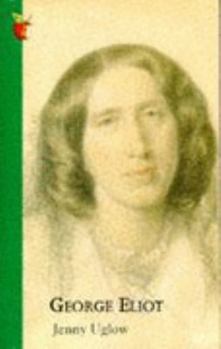George Eliot
Select Format
Select Condition 
Book Overview
Best known for her masterpieces "Middlemarch "and "Silas Marner," George Eliot (18191880) was both one of the most brilliant writers of her day, and one of the most talked about. Intellectual and... This description may be from another edition of this product.
Format:Hardcover
Language:English
ISBN:0860684008
ISBN13:9780860684008
Release Date:January 1987
Publisher:Random House (NY)
Length:288 Pages
Weight:0.58 lbs.
Customer Reviews
1 rating
The consummate biography and literary description of George Eliot
Published by Thriftbooks.com User , 16 years ago
Jenny Uglow's biography of George Eliot succeeds where most others have failed, namely in presenting the inner turmoil of an artist who was bound by her gender as much as by her hightened intellectual acuity. Having lost her faith and her family on pain of pursuing the life of a novelist. She was fully immersed in the woman question, as may be readily acknowledged through cursory reading of her novels, but it is in her letter and in her lifestyle that we are made privy to her struggle to lead a life of independence and freedom of expression that she was never willing to comprosmise. She was regarded as a brilliant writer by her contemporaries, who also did not see her novels as awefully unsettling, but it is on strength of her choosing to defy polite society and live her adopted unorthodox convictions while living with the philosopher George Lewes for a quarter of a century that marked her being designated as unfathomably confrontational. Jenny Uglow is exceptional in showing the writer at work and her concerns while never relinquishing the flow of the narrative and the focus of her subject. The biographer does not romanticize George Eliot, born Mary Ann Evans, rather often shows how what seemed rationally argued statements were in fact the product of lengthy consideration that emotionally and intellectually exhausted the author of Middlemarch. In this we see the workings of a mind beset by a sense of pride, imposing rational qualifications and an overall adherence to a responsibility she adhered to with a martyr's sincerity, even when swamped within her emotional moorings. Jenny Uglow is not without humor when describing George Eliot, and often gives anecdotes that allow us to see the humanity of the woman who inspite of her rough applications and rational charge did have a gracious sensibility which dissuaded her courage to overcome the strictures of her profession. From a letter on the woman subject reprinted by Uglow she will point out that "there is no subject on which I am more inclined to hold my peace and learn, than on the woman question. It seems to me to overhang abysses, of which even prostitution is not the worst. Conclusions seem easy as long as we keep large blinkers on and look in the direction of our own private path...I have been made rather miserable lately by revelations about woman, and have resolved to remain silent in my sense of helplessness." Of course in fiction she was able to be political in ways that she was reluctant to do on the social stage. She used the power of her fiction to direct ideas in ways that supervened the sentiments of the greater public and create heroines that were rational, tough minded and understanding of tradition. She, in short sought to give woman the choice she thought they were being denied, yet not so as to chose for them. Jenny Uglow is adept at showing parallels in her life and fiction, juxtaposing letters and anecdotes, and the literary criticism she suffered at the time. The biograph





